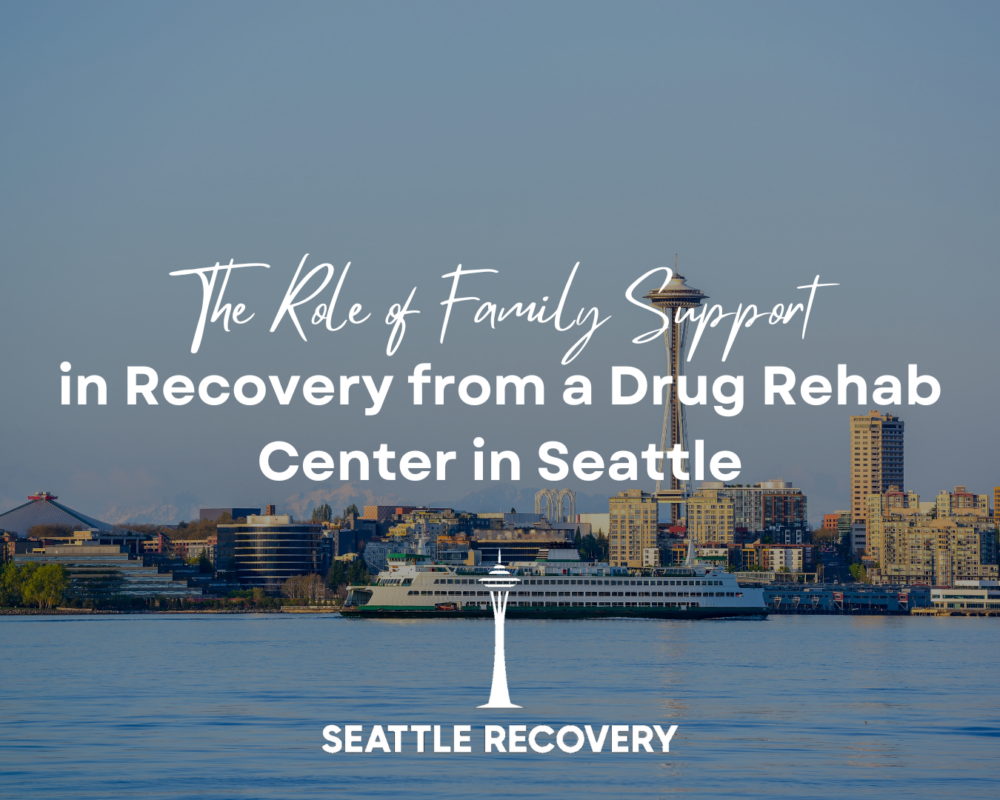Recovering from addiction isn’t just about individual determination or completing a treatment program. At Seattle Recovery, we believe that family support plays a pivotal role in the success of every person who enters a drug rehab center in Seattle. Addiction is a disease that not only affects individuals but also their families and close friends. When families get involved in the recovery process, the chances of long-term sobriety increase significantly.
In this article, we’ll discuss why family support is crucial during addiction treatment, explore how family members can contribute to their loved one’s recovery journey, and outline some of the different types of programs offered at Seattle Recovery to address various types of addiction. Whether you’re a family member or someone in recovery, understanding the impact of family involvement can empower you to take positive, supportive actions.
Why Family Support is Essential in Addiction Recovery
When a loved one enters a drug rehab center in Seattle, the entire family is impacted. Addiction often damages family relationships, creates mistrust, and leads to emotional wounds that take time to heal. But through intentional involvement and support, families can become a powerful part of the recovery process. Here are a few reasons why family support is invaluable:
- Increased Motivation: Knowing that family members are genuinely rooting for them can provide an invaluable layer of motivation for someone navigating the challenging path of recovery. The journey to sobriety can be fraught with obstacles, and having a loved one’s unwavering encouragement can serve as a powerful reminder of the support available, helping individuals push through even the most difficult times. This emotional backing can be crucial during moments of self-doubt or temptation.
- Reduced Isolation and Loneliness: Addiction often creates an incredibly isolating experience, making individuals feel as though they are facing their struggles alone. Family involvement is key to alleviating these feelings of loneliness. By actively participating in the recovery process, family members reassure the individual that they’re not alone on this journey. Regular family interactions can foster connections that remind the person in recovery of their worth and the love that surrounds them.
- Enhanced Accountability: With family members engaged in the recovery process, there’s an added layer of accountability that can be incredibly beneficial. Having a support network that regularly checks in and encourages positive behavior can motivate individuals to stay on the right track, reinforcing their commitment to sobriety. This accountability can manifest in various ways, such as setting regular family meetings to discuss progress or even sharing in activities that promote healthy choices together.
- Support for Building New, Healthy Habits: Recovery is not solely about quitting substance use; it’s fundamentally about creating a healthier lifestyle that encompasses mental, emotional, and physical well-being. Family members can play a vital role in helping to establish new routines, encouraging hobbies, and reinforcing positive choices. They can introduce healthy activities, such as cooking nutritious meals together, engaging in exercise routines, or exploring new interests, which can strengthen bonds and promote a sense of belonging.
- Healing for the Entire Family: Addiction impacts not only the person struggling but also their loved ones, often creating a ripple effect of pain and distress. Family involvement in recovery facilitates healing on both sides, allowing for open discussions about feelings and concerns that have arisen due to addiction. This shared experience can lead to stronger, healthier relationships in the future, as families learn to communicate better, understand one another’s struggles, and develop greater empathy and resilience together.
How Family Involvement Benefits the Recovery Process
Seattle Recovery firmly believes that when families work together with their loved ones, the results are powerful. Let’s look at some specific ways family support improves the recovery experience at our drug rehab center in Seattle.
1. Emotional Support and Encouragement
Recovery can be an emotional rollercoaster, filled with moments of self-doubt, fear, and uncertainty. Family members who remain positive, patient, and encouraging provide a much-needed emotional anchor. Having family members who believe in their loved one’s ability to overcome addiction fosters confidence and hope, both of which are essential for a successful recovery journey.
2. Participating in Therapy Sessions
At Seattle Recovery, we offer family therapy as part of our comprehensive treatment programs. These sessions create a safe space for family members to express their feelings, understand the root causes of addiction, and develop strategies for moving forward. Family therapy also equips family members with the tools to help their loved ones through difficult times and provides them with insights into the recovery process.
3. Reducing the Risk of Relapse
Studies show that individuals who feel emotionally supported by family members have lower rates of relapse. A supportive family environment can provide stability, encourage accountability, and act as a buffer against the temptations of relapse. By understanding their loved one’s triggers and avoiding certain stressors, family members can help create a more conducive environment for sobriety.
4. Establishing a New Daily Routine
One of the biggest challenges for individuals leaving a drug rehab center in Seattle is adjusting back into daily life. Family members can help by establishing a structured routine that reinforces healthy habits. This might include regular mealtimes, encouraging hobbies, physical activities, and other positive activities that keep the individual engaged and focused on their goals.
5. Building a Strong, Substance-Free Environment
One of the most critical roles family members can play is in creating a substance-free, supportive home environment. Recovery is a lifelong process, and a safe, stable environment is essential for long-term sobriety. Family members can help by encouraging a healthy lifestyle and removing triggers from the home.

Programs Offered at Seattle Recovery for Different Types of Drug Addictions
At Seattle Recovery, we offer a range of treatment programs designed to address various types of substance addictions. Each program is tailored to the unique needs of the individual, and we welcome family members to be a part of this process whenever possible. Here’s a look at some of the programs we offer:
1. Alcohol Addiction Treatment
Alcohol addiction is one of the most common forms of substance abuse, affecting individuals from all walks of life. Our alcohol treatment program combines detoxification, counseling, group therapy, and family therapy to address the complex nature of alcohol dependence. By involving family members in the recovery process, we create a strong support network that makes it easier for the individual to maintain sobriety.
2. Opioid Addiction Treatment
Opioid addiction has become a major public health crisis, and overcoming it requires specialized care. At our drug rehab center in Seattle, we offer medication-assisted treatment (MAT) for opioid addiction, which may include medications like methadone or buprenorphine to reduce cravings and withdrawal symptoms. Family involvement in opioid addiction recovery is critical, as the relapse risk is high, and emotional support from loved ones can make a world of difference.
3. Prescription Drug Addiction Treatment
Prescription drug addiction, including abuse of medications like benzodiazepines and stimulants, can be challenging to overcome. Our program offers individualized therapy sessions, family therapy, and support groups to address the physical and psychological aspects of prescription drug dependence. Family members play a role by understanding the triggers and challenges associated with prescription drug abuse and providing a stable, supportive home environment.
4. Cocaine Addiction Treatment
Cocaine addiction often leads to severe mental and physical health issues. Our cocaine addiction treatment program includes intensive therapy, group counseling, and family involvement. Family members are encouraged to participate in therapy sessions to understand the emotional toll that cocaine addiction takes and to learn ways to support their loved one in building a healthier lifestyle.
5. Methamphetamine Addiction Treatment
Meth addiction is known for its extreme hold on individuals, often leading to significant physical and mental health issues. Seattle Recovery provides a holistic approach to methamphetamine treatment, including detox, cognitive-behavioral therapy, and family counseling. Family support is especially important here, as meth addiction can lead to strained relationships. Rebuilding trust and offering a supportive environment is essential for long-term recovery.
How Families Can Offer Effective Support During Recovery
Supporting a loved one in recovery is both rewarding and challenging. Here are some actionable ways families can offer effective support:
1. Educate Yourself on Addiction
Understanding addiction as a disease is the first step in being a supportive family member. Addiction is not a moral failing; it’s a complex condition that affects the brain and behavior. Seattle Recovery offers educational resources and workshops for families to help them gain a better understanding of addiction and recovery.
2. Participate in Family Therapy
Family therapy is an integral part of the recovery process, and it provides a safe space for both the individual and their loved ones to express feelings and resolve past conflicts. Family therapy allows everyone to understand each other better and develop effective communication strategies that prevent misunderstandings and foster positive relationships.
3. Avoid Enabling Behaviors
It’s easy to confuse support with enabling. Enabling occurs when family members try to protect their loved ones from the consequences of their actions. While it may come from a place of love, enabling can make recovery harder. Setting boundaries, being honest, and allowing the individual to face the natural consequences of their behavior can ultimately support their journey toward independence and responsibility.
4. Encourage Healthy Activities and New Routines
Addiction recovery involves more than just avoiding substances; it’s about creating a fulfilling, substance-free lifestyle. Families can support this by encouraging activities that foster mental and physical well-being, such as exercise, hobbies, meditation, and mindfulness practices. A healthy, structured routine can keep individuals focused and grounded.
5. Practice Patience and Compassion
Recovery is not a quick fix; it’s a lifelong process that requires patience. Families should remain compassionate, even during setbacks. Individuals in recovery may experience relapses, and it’s essential to respond with understanding rather than judgment. Supportive words and gestures of kindness can provide comfort and motivation, reminding them that their loved ones believe in their ability to overcome addiction.
Additional Programs and Services at Seattle Recovery
Beyond addiction-specific treatments, Seattle Recovery also provides several other services designed to support individuals and their families throughout the recovery process.
1. Dual Diagnosis Treatment
For individuals struggling with both mental health issues and addiction, we offer dual diagnosis treatment. This program integrates mental health therapy with substance abuse counseling, helping individuals address both conditions simultaneously. Family members are often included in the process, learning how to support their loved ones through challenges related to both addiction and mental health.
2. Aftercare Planning
Aftercare is a critical component of our programs. It provides ongoing support for individuals who have completed their stay at our drug rehab center in Seattle. Aftercare may include regular check-ins, support groups, and family counseling. Families are encouraged to be part of the aftercare process to continue providing support and encouragement as their loved one transitions back into daily life.
3. Family Support Programs
We also offer specialized programs just for families. These include support groups and educational workshops that provide tools and resources for families navigating the challenges of supporting a loved one in recovery. Our family support programs are designed to empower family members with knowledge, coping strategies, and a network of others going through similar experiences.
Moving Forward Together: Family and Recovery at Seattle Recovery
Recovering from addiction is a deeply personal journey best undertaken with the unwavering support of loved ones. At Seattle Recovery, a leading Drug Rehab Center in Seattle, we recognize the profound impact that family involvement can have on an individual’s recovery experience. Family members often play a critical role in providing encouragement, understanding, and motivation, significantly enhancing the chances of successful recovery.
Our comprehensive treatment programs are designed to address the multifaceted nature of addiction, offering a wide range of therapeutic approaches tailored to individual needs. Additionally, our dedicated family support services focus on educating and involving family members in the recovery process, ensuring they have the tools and resources necessary to support their loved ones effectively.
We believe that when families come together, they can build a foundation for stronger, healthier futures. No matter where you find yourself on this journey—whether at the beginning or well along the path—it’s essential to remember that support, patience, and love are powerful elements that can make all the difference. Together, we can work toward lasting recovery and a brighter tomorrow, fostering resilience and healing for both individuals and their families. For more information visit our website https://seattlerecovery.org/ or call us at (206) 231-0252.







